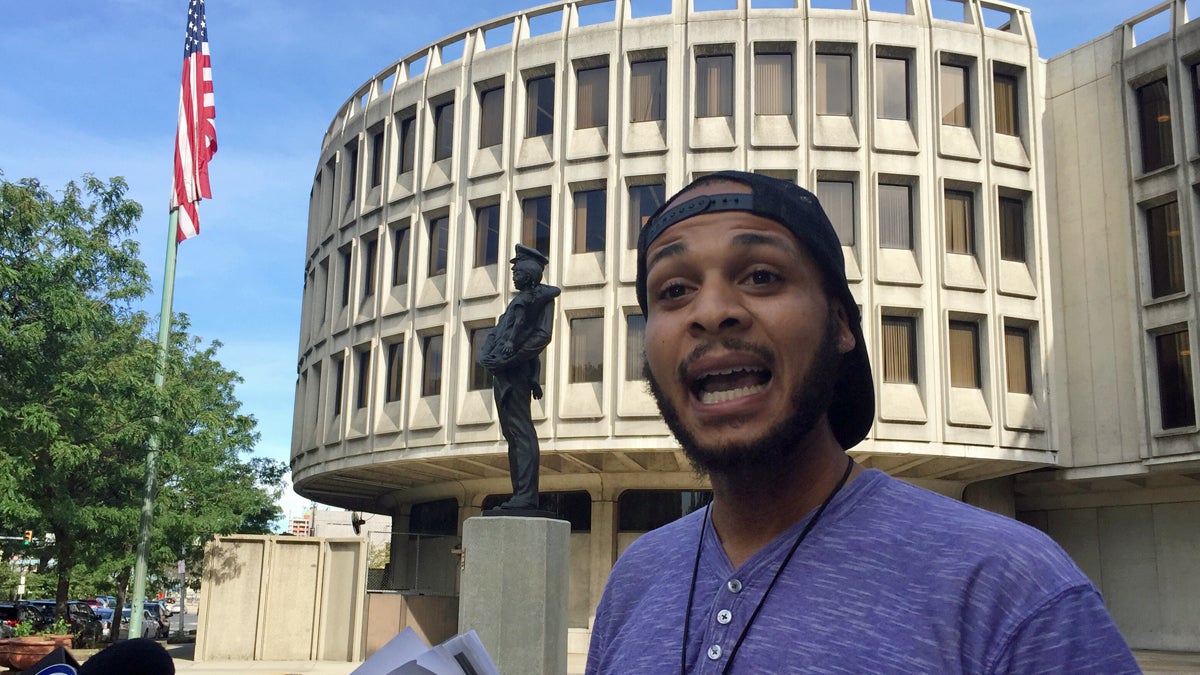Activists push Philly police for hearings on body-camera policy

Christopher Norris
Philadelphia police have outfitted nearly 300 officers with body cameras to increase transparency and trust with the community. But their implementation of the body-camera program has been neither transparent nor trustworthy, several police reformers say.
Kelvyn Anderson, who heads the Police Advisory Commission, and several activists gathered outside Philadelphia Police headquarters Wednesday afternoon to demand that the department hold public hearings on its body-camera policies and halt all efforts to expand a pilot body-camera program throughout the 6,600-officer force until hearings occur.
The commission also aims to hold its own public hearing on the cameras, which nearly 300 officers in the civil affairs unit and North Philadelphia’s 22nd District wear under the pilot program launched in 2014.
“We need to re-establish trust between our communities and the police departments who serve them,” Anderson said. “One of the most important ways of doing that — and noted in numerous reports in the years since Ferguson — is to allow citizens to have input into the policies that directly affect them.”
Of particular concern, Anderson noted, is the police department’s storage of body-camera footage for 30 days. That’s not long enough, and should be extended to a minimum of 60 to 90 days, as the Police Executive Research Forum recommends, Anderson added.
Christopher Norris, a blogger who has advocated for police reform on Philly In Focus, agreed: “What we’re addressing today is a pattern of community exclusion by the police department. The police department historically has acted as an island unto itself. It’s been self-reliant for insight into policy and habitually repellent of the thought leadership of others. The Police Department is asking for trust, and when they do things like this, they’re proving themselves to be untrustworthy. Trust cannot manifest where secrecy, elitism and a lack of accountability abounds. So today, we’re calling on Richard Ross and the Police Department to work with the Police Advisory Commission.”
But Lt. John Stanford, a police spokesman, bristled at any claims of secrecy.
“We have a ton of meetings with people in the community,” Stanford said. “There isn’t a week that goes by that Commissioner Ross isn’t in the community talking with people.”
Officials have no plans to hold public hearings on body cameras, because no one but “this small but noisy, close-minded group of individuals who on some days don’t even want the police department in existence” wants such hearings, Stanford said.
“This seems to be the same five, six, seven — at most 12 — individuals pushing issues because there’s nothing else to push,” Stanford added. “If this was a pressing issue, we would have hundreds of people standing up, pressing the issue. How much time do we take away from getting real issues done because we’re focusing on the rhetoric of six people?”
In a report issued last year on Philadelphia’s police-involved shootings, the U.S. Department of Justice knocked the Philadelphia Police Department for a lack of transparency, saying the department “does not fully accommodate the PAC in its role of providing independent civilian oversight of police operations in Philadelphia.” Such transparency problems “cement distrust” in the community, researchers wrote.
The report further recommended the department “collaborate with multiple stakeholders in the development of policies and protocols for use of BWCs (body-worn cameras)” and “engage with community members, particularly privacy advocates, to ensure the department deploys BWCs in a way that is in line with community values and expectations of privacy.” The report didn’t specifically call for public hearings.
WHYY is your source for fact-based, in-depth journalism and information. As a nonprofit organization, we rely on financial support from readers like you. Please give today.




